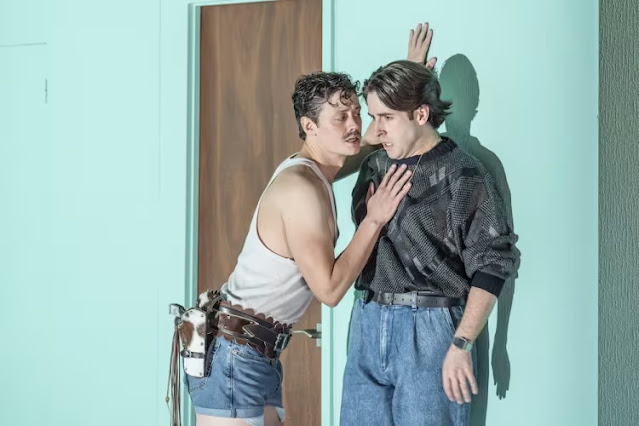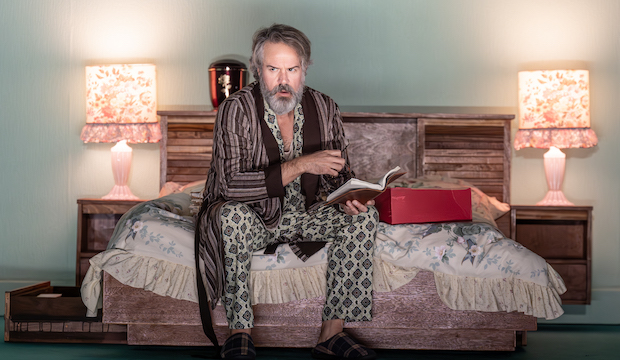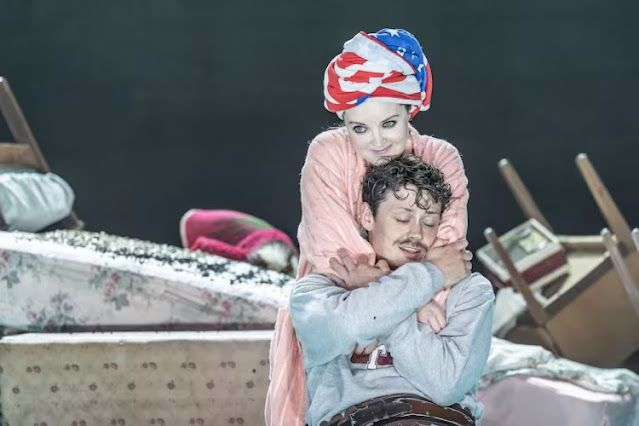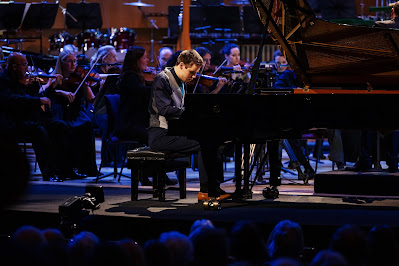 |
| Bernstein: A Quiet Place – Henry Neill, Elgan Llyr Thomas – Royal Ballet & Opera (Photo: Marc Brenner/ROH) |
Bernstein: Trouble in Tahiti, Bernstein: A Quiet Place; Henry Neill, Wallis Giunta, Grant Doyle, Rowan Pierce, Elgan Llyr Thomas/Benjamin Hulett, director: Oliver Mears, conductor: Nicholas Chalmers; Linbury Theatre, Royal Opera House
Reviewed 18 October 2024
A double bill of Bernstein rarity, fantastic performances of two operas that present a disturbing picture of family life in the 20th century with all its messiness, along with autobiographical references.
Leonard Bernstein wrote his one-act opera Trouble in Tahiti in 1952, the story of a troubled marriage inspired by his own parent’s marriage and one of Bernstein’s few music theatre works to set his own words. Thirty years later, he returned to the subject and this time with a libretto by Stephen Wadsworth produced A Quiet Place, examining what has happened to the family in Trouble in Tahiti in the intervening 30 years. A Quiet Place was premiered in a double bill with Trouble in Tahiti in 1983 but the new opera was not well received. Bernstein and Wadsworth produced a revised version where most of Trouble in Tahiti was incorporated into A Quiet Place as flashback. In this form the opera had some currency.
At the Linbury Theatre, the Royal Ballet and Opera has been revisiting Trouble in Tahiti and A Quiet Place in a new production by Oliver Mears, conducted by Nicholas Chalmers. The operas were performed in new versions by Garth Edwin Sunderland. Separated into two distinct operas again, Trouble in Tahiti was given in Sunderland’s reduced orchestration whilst A Quiet Place was presented in Sunderland’s adaptation of the libretto with the flashbacks removed, and again in a reduced orchestration. In Trouble in Tahiti, Henry Neill was Sam and Wallis Giunta was Dinah, then in A Quiet Place, Grant Doyle was Sam, Rowan Pierce and Henry Neill were his children, Dede and Junior. Elgan Llyr Thomas was intended to be Francois but Thomas was unable to sing and walked the role with Benjamin Hulett singing from the side of the stage.
 |
| Bernstein: A Quiet Place – Grant Doyle – Royal Ballet & Opera (Photo: Marc Brenner/ROH) |
We saw Trouble in Tahiti in 2017 as part of Opera North’s The Little Greats season when it was in a double bill with Gilbert & Sullivan’s Trial by Jury [see my review]. Oliver Mears and designer Annemarie Woods took a more downbeat view of the opera than Matthew Eberhardt at Opera North, perhaps influenced by the fact that the second half of the double bill at the Linbury was distinctly downbeat indeed.
Woods’ set was a bare box and scenes had a minimum of set dressing (only a chair and phone for Sam’s office). Bernstein’s opera has a number of invisible or imagined characters (only Sam and Dinah sing), but here this use of the audience’s imagination extended to the set details. The jazz trio (Peter Edge, Guy Elliott, Kirsty McLean) that sings upbeat jingles which jar unnervingly with the action of the opera were here presented as three rather unnerving observers, looking down on the action and certainly their fine musical contribution did nothing to liven the atmosphere. Mears concentrated on the disintegration of Sam and Dinah’s marriage, creating long extended solo sections for each. We lost much of Bernstein’s detailed action, so that Dinah’s solo about the film Trouble in Tahiti simply took place in her bedroom. Rather intriguingly, Sam’s solo in the gym was given a very homoerotic twist including the large shadow of an apparently naked man in an adjacent changing room, suggesting interest to Sam.
Wallis Giunta made Dinah’s dissatisfaction and restlessness rather appealing, she drew you into the woman’s plight even though Bernstein’s opera seems to suggest that both characters are equally responsible. Henry Neill was wonderfully stiff and proper as Sam, yet finely suggested the troubled man that lay underneath. The two brought great intensity to the couple’s interactions, and the ending was profoundly downbeat, you sensed that this marriage was doomed.
 |
| Bernstein: A Quiet Place – Rowan Pierce, Henry Neill – Royal Ballet & Opera (Photo: Marc Brenner/ROH) |
After the interval we had A Quiet Place. 30 years has passed. The opera’s prologue was Dinah’s car crash, we learn she had been drinking. The opera proper opened in the funeral parlour with a scene for the funeral director, Nick Pritchard, and Dinah’s friends, Sarah Pring, Freddie Tong, Eddie Wade, Rebecca Afonwy-Jones and Robin Bailey, plus a quartet of singers, Peter Edge, Guy Elliott, Heather Lowe, Kirsty McLean. Given that the majority of the opera concentrates on the four principals, this use of six extra character singers was rather extravagant, but all concerned had fun with the implicit comedy of the scene.
That is, until the family arrived. For the remainder of the opera the major disfunction in the family plays out. The funeral turns into chaos, then in Act Two, Sam goes through Dinah’s things and there are reminiscences and troubles, then in the final act, in the garden next morning, they learn that Dinah committed suicide. A rapprochement disintegrates but the opera ends up on a moment of hope and possility.
A Quiet Place remains a fascinating experiment and probably works better now than it ever did, but it is undoubtedly far too long. At 1 hour 40 minutes, we just spent too much time with this rather annoying family and the long final scene, which Bernstein called Mahlerian, just takes too much time to reach its conclusion. It is a shame that Sunderland did not fillet the opera when he made this version, it would benefit from tightening up, losing 20 minutes or so.
That said, the performances were superb and under Nicholas Chalmer’s loving and intelligent direction the cast did manage to draw you in. Top of the list must be Henry Neill, who having given us a finely buttoned up but troubled picture of younger Sam, plays Sam’s son, Junior. Rocking a ripped t-shirt and tiny, tiny shorts and very little else, Neill gave us a charismatic yet troubled Junior, managing to bring off the character’s psychotic episodes (Junior has mental health issues) which are one of the opera’s least successful and troubling aspects. As his sister, Dede, Rowan Pierce was all prickly attitude and underlying need in another astonishing performance. Grant Doyle was brilliantly gruff and rough as the older Sam who has come adrift from his children, has had 40 years of unsatisfactory marriage yet finds he still misses his wife. Between them Elgan Llyr Thomas and Benjamin Hulett gave a fine account of Francois, who loves the brother and is married to the sister, making us forget at times that it was two people playing the character.
The smaller roles were all superbly taken, and I was particularly taken with Nick Pritchard’s Funeral Director who was appallingly ingratiating yet so lacking in emotional intelligence, and Sarah Pring’s spiky Mrs Doc whose thoughts about the undesirability of funeral services probably echoed many peoples.
 |
| Bernstein: Trouble in Tahiti – Henry Neill – Royal Ballet & Opera (Photo: Marc Brenner/ROH) |
In the pit, Nicholas Chalmers and the small orchestra made a terrific contribution, certainly there was nothing ‘reduced’ about this performance. A Quiet Place has some significant orchestral interludes where the orchestra came into its own. This was Chalmer’s debut conducting a main stage production for the company and I do hope we will be seeing a lot more of him
These two opera have a lot to say about the human condition in the 20th century and particularly the American way of life, but also in retrospect we can reflect on Bernstein’s own complex personal life. But when all is said and done, the material did not quite stretch to the nearly three hours in the theatre that was presented and I do hope that the Bernstein estate (for whom Sunderland works) might sanction further adjustments to A Quiet Place.
There is one extra comment about the progress of the drama from Trouble in Tahiti to A Quiet Place. If Bernstein had written a third opera, set perhaps fifteen years after A Quiet Place, then we would almost certainly been detail with the impact of the AIDS crisis on Francois and Junior.
The blog is free, but I’d be delighted if you were to show your appreciation by buying me a coffee.
Elsewhere on this blog
- Leading with a love that inspires: Tafelmusik has a new collaboration with violinist Rachel Podger & a new disc of Haydn symphonies – interview
- A themed programme with an imaginative difference: Music from Pole to Pole with City of London Sinfonia and atmospheric physicist Dr Simon Clark – concert review
- Sound magic: En Couleur from the percussion group, Trio Colores – record review
- From expressionist nightmare to radiant energy: Schoenberg’s Pierrot Lunaire & Schubert’s String Quintet at Hatfield – concert review
- Charpentier’s Actéon & Rameau’s Pygmalion: a perfect double-bill offering a delightful, entertaining evening – opera review
- Intimate & communicative: Solomon’s Knot brings its distinctive approach to Monteverdi’s Vespers of 1610 at Wigmore Hall – concert review
- Waiting till they feel they have something to say: I chat to Trio Bohémo about their debut disc – interview
- On tour from New York, the Philip Glass Ensemble stopped off in Cambridge in a presentation by the Cambridge Music Festival – concert review
- Everyone clearly enjoyed themselves & brought the house down: The Sixteen in Monteverdi’s Vespers of 1610 at Temple Church – concert review
- Une messe imaginaire: Bruckner & Frank Martin from Lyon – record review
- Home










